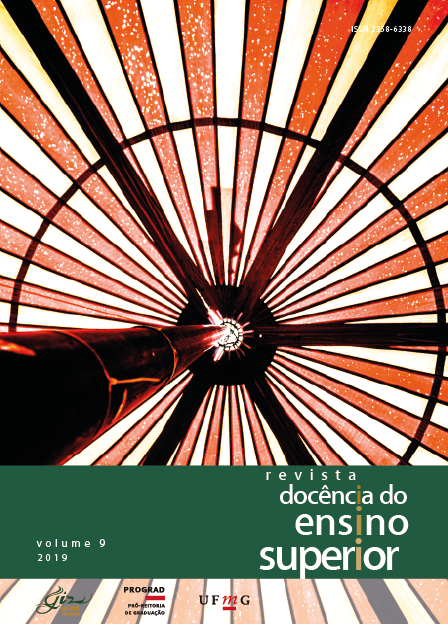Afetividad y enseñanza
marcas de dos profesores inolvidables del área de la Matemática
DOI:
https://doi.org/10.35699/2237-5864.2019.13490Palabras clave:
Afectividad, Decisiones pedagógicas, Relación alumno-profesor, Educación universitariaResumen
Este artículo analiza narraciones sobre dos profesores identificados como inolvidables – profesionales que marcan positivamente la vida de sus estudiantes. Para esto, se realizó una entrevista con un profesor en una universidad pública y una encuesta virtual sobre recordar al profesor inolvidable en la universidad donde trabaja este profesor, y uno de los encuestados lo nombró como su profesor inolvidable. Con esto, fue posible alinear las declaraciones de los encuestados, identificando las marcas dejadas por los profesores y que fueron transferidas a la práctica docente. Las decisiones y las prácticas pedagógicas del profesor inolvidable, clasificadas en núcleos y subnúcleos, se identificaron en las narraciones. Reconocer la mediación del profesor y darse cuenta del afecto contenido en él, que se expresó en las entrevistas, nos da ejemplos de cómo esta mediación y las decisiones en la planificación de la enseñanza afectan y marcan a los estudiantes.
Descargas
Descargas
Publicado
Número
Sección
Licencia
Los autores que publican en esta revista conservan los derechos de autor y otorgan a la revista el derecho de primera publicación, siendo la obra licenciada simultáneamente bajo la Creative Commons Attribution License, que permite compartir la obra con reconocimiento de autoría y publicación inicial en esta revista.
Los autores están autorizados a asumir contratos adicionales por separado, para la distribución no exclusiva de la versión del trabajo publicado en esta revista (por ejemplo, publicación en un repositorio institucional o como capítulo de libro), con reconocimiento de autoría y publicación inicial en esta revista.
Política de acceso abierto:
La Revista Docência do Ensino Superior es una revista de Acceso Abierto, lo que significa que todo el contenido está disponible de forma gratuita, sin costo para el usuario o su institución. Los usuarios pueden leer, descargar, copiar, distribuir, imprimir, buscar o vincular a los textos completos de los artículos, o utilizarlos para cualquier otro propósito legal, sin necesidad de obtener el permiso previo del editor o autor, siempre que respeten la licencia de uso. los Creative Commons utilizados por la revista. Esta definición de acceso abierto está en línea con la Iniciativa de Acceso Abierto de Budapest (BOAI).



























